We may not have the course you’re looking for. If you enquire or give us a call on +64 98874342 and speak to our training experts, we may still be able to help with your training requirements.
Training Outcomes Within Your Budget!
We ensure quality, budget-alignment, and timely delivery by our expert instructors.

Are you curious about how much a Data Scientist earns and what drives the lucrative nature of this profession? The role of a Data Scientist is highly sought after, combining analytical prowess with technological skills. It's a career that promises both intellectual challenge and financial reward. But what exactly does the Data Scientist Salary look like across different regions and industries? In this blog, we’ll explore answers to all these questions.
Join us as we dive deep into the world of Data Scientist Salary. We'll provide insights into expected earnings based on your role, industry, and location. Additionally, we'll offer guidance on the qualifications and skills needed to maximise your earning potential. Ready to uncover the financial rewards of being a Data Scientist? Let's get started.
Table of Contents
1) Who is a Data Scientist?
2) Data Scientist Salary Based on Location
3) Data Science Salaries by Industry
4) Data Scientist Salary Based on Job Roles
5) Data Scientist Salary Based on Experience Level
6) Data Scientist Salary in India vs the UK
7) Qualifications Required to Become a Data Scientist
8) Conclusion
Who is a Data Scientist?
A Data Scientist is an analytical expert who collects, analyses and interprets data to help organisations make decisions. Combining elements from mathematics, science, statistics, and programming, a Data Scientist uses advanced techniques like machine learning and predictive modelling.
They handle large datasets, analyse trends, assess risks, and tackle challenges like customer behaviour prediction, fraud detection, and healthcare analytics.
Data Scientist Salary Based on Location
The earning potential of a Data Scientist’s Salary can differ based on location. Here’s a glimpse into the potential earnings across various countries:
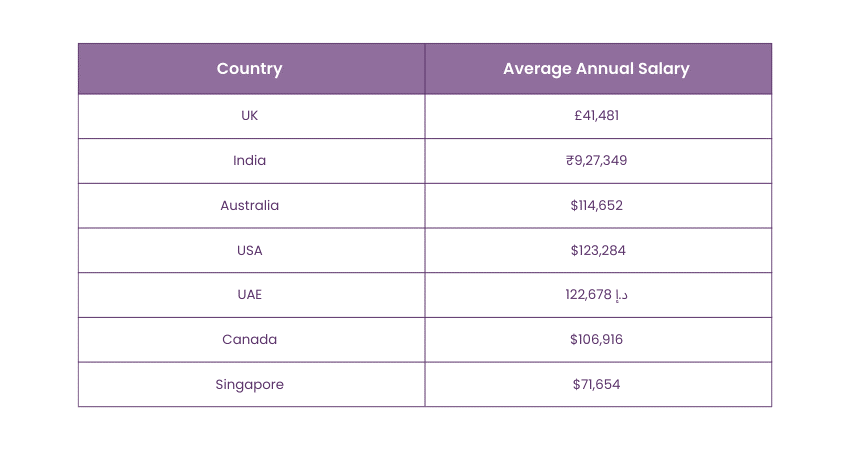
Source: Glassdoor
UK
a) The average annual salary in the UK for a Data Scientist in the UK is £41,481.
b) This reflects the growing demand for Data Science skills in various sectors like finance, healthcare, and technology.
c) The UK offers a dynamic work environment with opportunities for professional growth and development.
India
a) The average salary in India for a Data Scientist is ₹9,27,349.
b) This reflects the increasing demand for Data Science skills across a variety of industries, including finance, healthcare, and technology.
c) Despite the lower salary compared to Western countries, the cost of living in India is also significantly lower.
Australia
a) Data Scientists in Australia earn an average of $114,652 annually.
b) The high demand for data skills in industries such as mining, finance, and healthcare drives these competitive salaries.
c) Australia's strong economy and quality of life make it an attractive destination for data professionals.
USA
a) The average annual salary in the USA for a Data Scientist is $123,284.
b) The tech industry, especially in hubs like Silicon Valley, offers lucrative opportunities and high salaries.
c) The demand for Data Science skills is widespread across multiple industries, including finance, technology and healthcare.
UAE
a) Data Scientists in the UAE have an average annual salary of د.إ 122,678.
b) The UAE is spending heavily on technology and innovation, boosting the demand for Data Science expertise.
c) The tax-free salary and high quality of life make the UAE an appealing option for professionals.
Canada
a) The average annual salary in Canada for a Data Scientist is $106,916.
b) Canada’s diverse economy and growing tech industry provide numerous opportunities for data professionals.
c) The country is known for its high standard of living and work-life balance.
Singapore
a) Data Scientists in Singapore earn an average annual salary of $71,654.
b) Singapore is Asia's leading tech powerhouse, with a strong focus on innovation and data-driven decision-making.
c) Despite lower salaries compared to Western countries, Singapore offers a high quality of life and robust professional opportunities.
Data Scientists Salaries by Industry
This table outlines the average annual salaries of various industries in the field of Data Scientists.
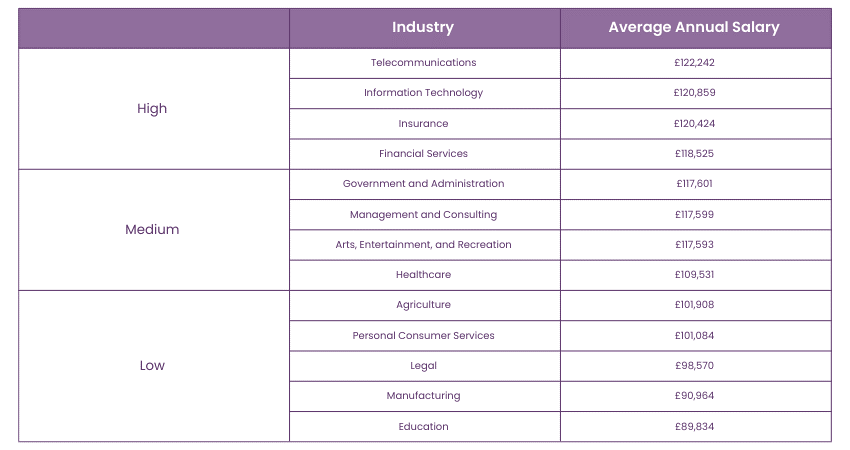
Source: Glassdoor
1) High:
Telecommunications:
a) The average salary in telecommunications is £122,242.
b) This high salary reflects the industry's crucial role in connecting people and businesses.
Information Technology:
a) IT professionals earn an average of £120,859 annually.
b) The high demand for tech skills and innovation drives these competitive salaries.
Insurance:
a) In the insurance industry, the average salary is £120,424.
b) This sector values Data Analysis and risk management, leading to high remuneration.
Financial Services:
a) Financial services offer an average salary of £118,525.
b) The industry is vital to the economy, with high pay for roles in banking, investment, and financial planning.
2) Medium:
Government and Administration:
a) The average salary in government and administration is £117,601.
b) These roles ensure efficient public services and policy implementation.
Management and Consulting:
a) Management and consulting professionals earn an average of £117,599.
b) They provide strategic advice and solutions to improve business performance.
Arts, Entertainment, and Recreation:
a) The average salary in this sector is £117,593.
b) Creativity and innovation in arts and entertainment are well rewarded.
Healthcare:
a) Healthcare professionals earn an average of £109,531.
b) This reflects the critical importance of medical and health services in society.
3) Low:
Agriculture:
a) The average salary in agriculture is £101,908.
b) This sector is fundamental for food production and sustainability.
Personal Consumer Services:
a) Personal consumer services offer an average salary of £101,084.
b) Roles in this industry cater to individual needs and personal care.
Legal:
a) Legal professionals earn an average of £98,570.
b) The legal field requires specialised knowledge and expertise.
Manufacturing:
a) The average salary in manufacturing is £90,964.
b) This industry focuses on producing goods and materials for various markets.
Education:
a) Education professionals earn an average of £89,834.
b) The education sector is dedicated to teaching and shaping future generations.
Enhance your data expertise with the Python Data Science Course - join now and become a data science pro!
Data Scientist Salary Based on Job Roles
Here are some common types of Data Scientists and their average salaries in the UK:
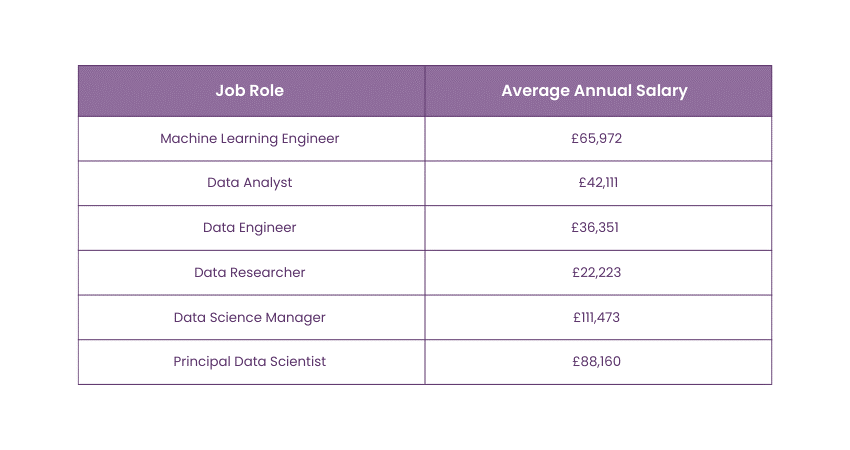
Source: Glassdoor
1) Machine Learning Engineer:
a) The average salary for a Machine Learning Engineer is £65,972.
b) They build and maintain machine learning models to make predictions and automate tasks.
2) Data Analyst:
a) Data Analysts earn an average of £42,111 annually.
b) They interpret and analyse data to help companies make informed decisions.
3) Data Engineer:
a) Data Engineers have an average salary of £36,351.
b) They design and manage data systems to ensure reliable data flow and storage.
4) Data Researcher:
a) The average salary for a Data Researcher is £22,223.
b) They collect and analyse data for research purposes, often in academic or scientific settings.
5) Data Science Manager:
a) Data Science Managers earn an average of £111,473 per year.
b) They lead data science teams, overseeing projects and strategies to drive business insights.
6) Principal Data Scientist:
a) The average annual salary for a Principal Data Scientist is £88,160.
b) They are senior experts in data science, guiding complex projects and mentoring junior staff.
Transform your skills with Data Science And Blockchain Training - sign up today to boost your future!
Data Scientist Salary Based on Experience Level
Data Scientist Salary can vary widely, depending on various factors. To get a clearer picture, it’s useful to divide the salary range into different levels of experience:
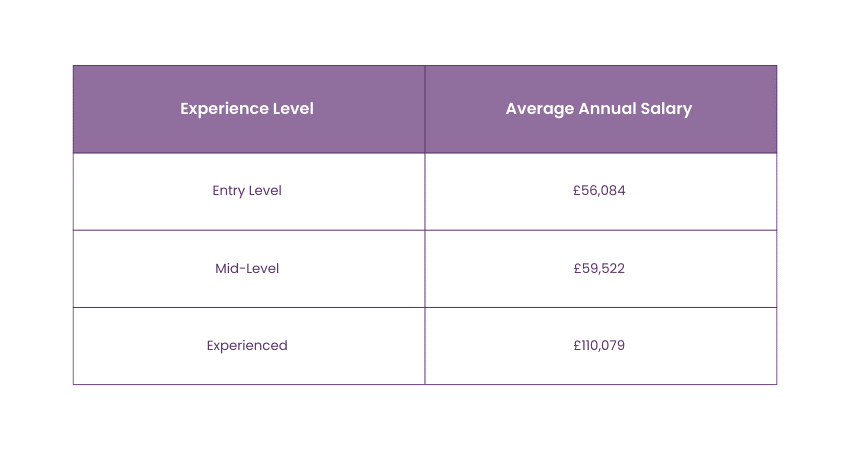
Source: Glassdoor
Entry-level
a) The average salary for entry-level positions is £56,084.
b) This is for professionals who are just starting their careers in the field, often requiring supervision and training.
Mid-level
a) Mid-level professionals earn an average of £59,522 annually.
b) They have some experience and a deeper understanding of their job roles, often taking on more responsibility and complex tasks.
Experienced
a) Experienced professionals have an average salary of £110,079.
b) These are highly skilled individuals with significant expertise and years of experience in their field. They often lead teams and projects.
Data Scientist Salary in India vs the UK
Data Scientists use data to solve complex problems and make informed decisions. Their salary depends on various factors, such as location, experience, industry, and skills. The table below compares the average salaries of Data Scientists in India and the UK based on different job roles
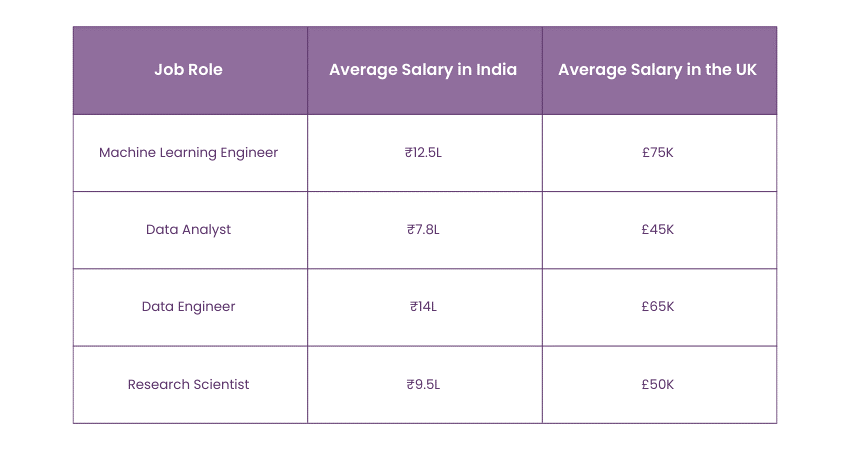
Source: Glassdoor
The table shows that Data Scientists in the UK tend to earn higher salaries than in India. However, this difference is also influenced by the cost of living and quality of life in each country. Therefore, Data Scientists should consider both the economic and personal aspects when choosing their career path.
Qualifications required to become a Data Scientist
To become a Data Scientist, you typically need a combination of education, skills, and experience. Here are the key qualifications and requirements:
Educational background
One of the first steps to becoming a Data Scientist is to acquire a relevant educational background. This will help you develop the necessary skills and knowledge for Data Analysis and Modelling. Here are the common educational qualifications for Data Scientists:
1) Bachelor's degree: Many Data Scientists start with a bachelor's degree in a related field, such as Computer Science, Mathematics, Statistics, Physics, Engineering, or Economics. A strong foundation in Mathematics and Computer Science is essential.
2) Advanced degree (Optional): While not always mandatory, having a master's or PhD. in Data Science, Machine Learning, Artificial Intelligence, or a related field can significantly enhance your qualifications and job prospects in this competitive field.
Key skills and knowledge
Besides having a strong educational background, Data Scientists also need to master a range of skills and knowledge that are essential for working with data. Here are the key skills and knowledge for Data Scientists:
1) Programming: Proficiency in programming languages like Python and R is essential for Data Analysis, Machine Learning, and data visualisation.
2) Statistics and Mathematics: A solid understanding of statistical concepts, linear algebra, calculus, and probability theory is crucial for data modelling and analysis.
3) Machine Learning: Familiarity with machine learning algorithms and techniques, including supervised and unsupervised learning, deep learning, and natural language processing, is vital.
4) Data manipulation and analysis: Skills in data manipulation libraries like Pandas and data visualisation tools like Matplotlib and Seaborn are important for exploratory Data Analysis and reporting.
5) SQL: Knowledge of Structured Query Language (SQL) is necessary for working with databases and querying data.
6) Data cleaning and preprocessing: Ability to clean and preprocess data to ensure its quality and suitability for analysis.
7) Big Data technologies: Prior knowledge in Big Data technologies such as Hadoop and Spark is valuable for handling large datasets.
8) Data visualisation: Proficiency in data visualisation tools like Tableau, Power BI, or libraries like D3.js can help in communicating insights effectively.
Soft skills
In addition to technical skills and knowledge, Data Scientists also need to possess certain soft skills that are vital for succeeding in this field. Here are the soft skills for Data Scientists:
1) Problem-solving: Data Scientists should excel at problem-solving and be able to approach complex issues analytically.
2) Communication: Effective communication skills are essential for explaining findings and insights to non-technical stakeholders.
3) Teamwork: Collaboration with Data Engineers, Analysts, and other team members is often required.
4) Curiosity: A natural curiosity drives Data Scientists to explore data, ask questions, and uncover hidden insights.
5) Critical thinking: Critical thinking allows Data Scientists to evaluate data and methodologies critically, ensuring robust analysis and decision-making.
6) Creativity: Creativity helps in finding innovative solutions to data-related problems and generating new hypotheses.
7) Adaptability: The field of Data Science evolves rapidly. Being adaptable and open to learning new tools and techniques is essential.
8) Time management: Data Scientists often work on multiple projects simultaneously. Effective time management ensures they meet deadlines and maintain quality.
9) Ethical awareness: Data Scientists must handle data responsibly, respecting privacy and ethical considerations.
10) Attention to detail: Precision in data collection, cleaning, and analysis is essential to avoid errors and inaccuracies.
11) Presentation skills: The ability to create compelling data visualisations and present findings persuasively is vital for conveying insights.
Boost your data science expertise with our Advanced Data Science Certification - start today and achieve professional growth!
Conclusion
Data Scientist Salary varies significantly by location, industry, and experience. By acquiring the appropriate skills and qualifications, you can maximise your earning potential and seize lucrative opportunities in this dynamic field. Embrace the challenge and unlock your financial rewards today!
Unlock your potential in the world of data – Join our Data Science Courses today!
Frequently Asked Questions

Experience significantly impacts a Data Scientist’s Salary. Entry-level professionals earn less. Mid-level and experienced Data Scientists command higher salaries because of their advanced skills, and ability to lead complex projects.

Yes, certain industries pay Data Scientists more than others. High-paying industries include telecommunications, information technology, and financial services, while sectors like education and manufacturing tend to offer lower salaries.

The Knowledge Academy takes global learning to new heights, offering over 30,000 online courses across 490+ locations in 220 countries. This expansive reach ensures accessibility and convenience for learners worldwide.
Alongside our diverse Online Course Catalogue, encompassing 17 major categories, we go the extra mile by providing a plethora of free educational Online Resources like News updates, blogs, videos, webinars, and interview questions. By tailoring learning experiences further, professionals can maximise value with customisable Course Bundles of TKA.

The Knowledge Academy’s Knowledge Pass, a prepaid voucher, adds another layer of flexibility, allowing course bookings over a 12-month period. Join us on a journey where education knowsno bounds.

The Knowledge Academy offers various Data Science Courses, including Probability And Statistics For Data Science Training, Python Data Science Course and Data Science With R Training. These courses cater to different skill levels, providing comprehensive insights into Data Mining Techniques.
Our Data, Analytics & AI Blogs cover a range of topics related to Data Scientist, offering valuable resources, best practices, and industry insights. Whether you are a beginner or looking to advance your Data Analysis skills, The Knowledge Academy's diverse courses and informative blogs have you covered.







 Top Rated Course
Top Rated Course




 If you wish to make any changes to your course, please
If you wish to make any changes to your course, please


